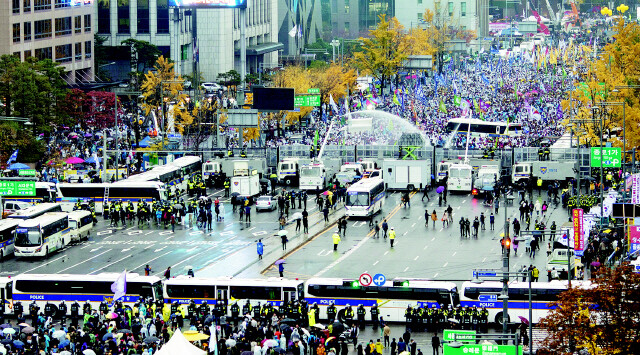hankyoreh
Links to other country sites 다른 나라 사이트 링크
UN Special Rapporteur criticizes S. Korean government on rights to assembly

During a meeting of the UN Human Rights Council (UNHRC) in Geneva, Switzerland, on June 16, Maina Kiai, UN Special Rapporteur on the rights to freedom of peaceful assembly and association, expressed his serious concern about how the South Korean government has been suppressing assemblies and demonstrations.
“The South Korean government’s use of water cannons is indiscriminate, and in some cases it is aimed at specific individuals. That would be hard to justify,” Kiai said.
Kiai visited South Korea in January to assess the current status of the freedoms of assembly, association and expression in the country. “Water cannons increase the risk that demonstrators will suffer grievous harm,” said Kiai in the report on South Korea that he delivered on Thursday. Kiai was referring to the experience of Baek Nam-ki, a farmer who was knocked out by a water cannon during a nationwide rally in Nov. 2015.
Along with water cannons, Kiai also expressed his view that South Korea should reconsider the use of the vehicle barriers that the police set up on the road. “Vehicle barriers are being used not so much to manage the actions of demonstrators as to preemptively hinder them from exercising the freedom of peaceful assembly,” he said.
Kiai also expressed concerns about the indiscriminate use of criminal prosecutions against demonstrators, mentioning in particular Park Rae-goon, a member of the standing committee for April 16th Solidarity, and Han Sang-gyun, president of the Korean Confederation of Trade Unions. Park and Han were arrested for organizing last year’s Sewol rally and the nationwide rally, respectively.
“It is excessive and unreasonable to hold the organizers of a demonstration liable for damage resulting from the illegal activity of other individuals. Demonstrators must not be investigated or prosecuted in criminal or civil court simply because they participated in a demonstration,” Kiai said.
“Unconditional bans must not be placed on the times and locations of public assemblies. The South Korean government needs to revise the Assembly and Demonstration Act and improve the way that act is applied.”
In related news, former comfort woman Kim Bok-dong, 90, who traveled to Geneva on June 13, met with Dubravka Simonovic, special UN rapporteur on violence against women, on June 16. During the meeting, Kim called on the Japanese government to apologize and asked the UN for its cooperation.
The Korean Council for the Women Drafted for Military Sexual Slavery by Japan (Jeongdaehyeop), which accompanied Kim to Geneva, reported that Simonovic said during the meeting that the agreement reached by the governments of South Korea and Japan appears to have disregarded the principles and recommendations of the Committee on the Elimination of Discrimination against Women and other human rights organizations. The special rapporteur also promised to do her best to ensure that the UN would support and cooperate with the former comfort women, Jeongdaehyeop said.
By Lee Seung-joon, staff reporter
Please direct questions or comments to [english@hani.co.kr]

Editorial・opinion
![[Column] A death blow to Korea’s prosecutor politics [Column] A death blow to Korea’s prosecutor politics](https://flexible.img.hani.co.kr/flexible/normal/500/300/imgdb/original/2024/0415/7517131654952438.jpg) [Column] A death blow to Korea’s prosecutor politics
[Column] A death blow to Korea’s prosecutor politics![[Correspondent’s column] The US and the end of Japanese pacifism [Correspondent’s column] The US and the end of Japanese pacifism](https://flexible.img.hani.co.kr/flexible/normal/500/300/imgdb/original/2024/0412/1017129080945463.jpg) [Correspondent’s column] The US and the end of Japanese pacifism
[Correspondent’s column] The US and the end of Japanese pacifism- [Guest essay] How Korea turned its trainee doctors into monsters
- [Guest essay] As someone who helped forge Seoul-Moscow ties, their status today troubles me
- [Editorial] Koreans sent a loud and clear message to Yoon
- [Column] In Korea’s midterm elections, it’s time for accountability
- [Guest essay] At only 26, I’ve seen 4 wars in my home of Gaza
- [Column] Syngman Rhee’s bloody legacy in Jeju
- [Editorial] Yoon addresses nation, but not problems that plague it
- [Column] Can Yoon and Han stomach humble pie?
Most viewed articles
- 1[News analysis] Watershed augmentation of US-Japan alliance to put Korea’s diplomacy to the test
- 2[Guest essay] How Korea turned its trainee doctors into monsters
- 3[Column] A death blow to Korea’s prosecutor politics
- 4[Photo] Cho Kuk and company march on prosecutors’ office for probe into first lady
- 5[Column] A third war mustn’t be allowed
- 6‘National emergency’: Why Korean voters handed 192 seats to opposition parties
- 7Exchange rate, oil prices, inflation: Can Korea overcome an economic triple whammy?
- 8After Iran’s attack, can the US stop Israel from starting a regional war?
- 9[Editorial] New KBS chief is racing to deliver Yoon a pro-administration network
- 10[Editorial] Stagnant youth employment poses serious issues for Korea’s future